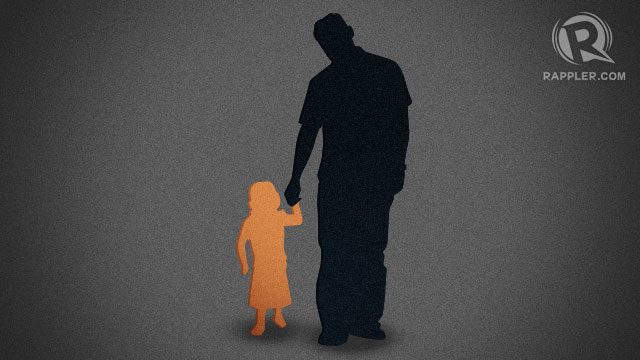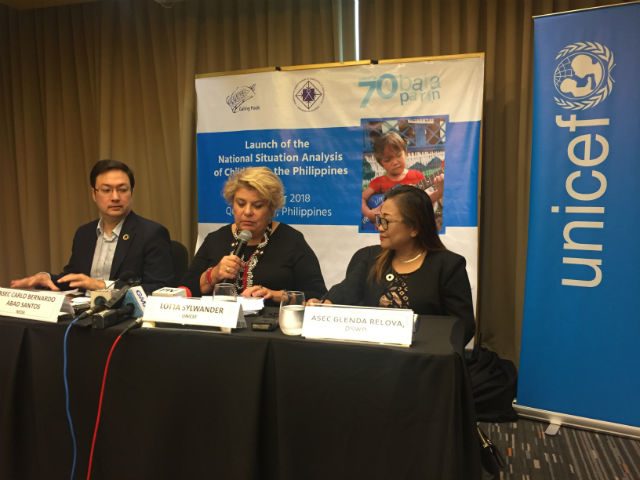SUMMARY
This is AI generated summarization, which may have errors. For context, always refer to the full article.

MANILA, Philippines – Poverty, conflict, and natural disasters often leave children in harm’s way, but some Filipino social norms may also deprive children of their rights, the United Nations Children’s Fund (UNICEF) and Department of Social Welfare and Development (DSWD) said on Tuesday, October 9.
In a press briefing on the sidelines of a report on the Situation Analysis of Children in the Philippines launched Tuesday, UNICEF representative to the Philippines Lotta Sylwander explained long-held beliefs and practices have contributed to children’s vulnerability, particularly when it came violence against children.
“In so many fields we encounter social norms are the barriers, (rather than) services or poverty,” Sylwander said.
Among the key findings on children in the Philippines were that 2 in 3 children experienced physical violence, 2 in 5 psychological violence, 1 in 4 sexual violence, and 2 in 3 peer violence. According to Sylwander, violence against children often took place at home. (READ: The effects of sexual harassment on children)
Finding also showed that more males than females experienced sexual violence both at home and in school with about 1 in 4 boys reporting some form of abuse while about 1 in 5 girls did.
“Majority of the abusers and perpetrators are mothers, fathers, siblings and cousins. In most cultures, that’s unacceptable, it’s called incest and I’m sure it is here – no, I know it is here and its going on,” Sylwander said, noting this was the case for children across all social classes.
She added, “And so there is something very seriously wrong with social norms if that’s going on at that scale in the Philippines.”
Sylwander also pointed that such was the case when it came to disciplining children. (READ: Senate passes bill banning corporal punishment vs children)
“Physical violence in itself – that it seemed to be the only resort in terms of disciplining children. That there is no other way as a parent or a teacher to make your message heard as a child. That’s one example where we believe we really need to work on the social norms,” she said.
Silence and stigma
According to DSWD Assistant Secretary Glenda Relova, social norms also affect child protection when it comes to reporting cases of abuse.
“The culture of violence isn’t reported because of the stigma that once this child reports, it’s unacceptable for the family…this “mahiyain” or shyness type, prevents children from articulating whats really happening to them,” Relova said. (WATCH: Stop the silence)

Health and education, too
Apart from violence against children, Sylwander also said social norms could affect the health and education of children.
This was seen in perceptions around sexuality and reproductive health, which have contributed to a rise in teen fertility and new Human Immunodeficiency Virus and Acquired Immune Deficiency Syndrome (HIV-AIDS) infections among the youth.
Data cited in the study showed a reverse in declining rates of birth rates with 59.2 among 1,000 births occurring among those 15 to 19 years as compared to 49 births recorded in 1997. Between 2011 and 2015, there was also a 230% increase in newly-diagnosed HIV cases among adolescents and teenagers.
“At this rate that we have, the number of teenage pregnancies, the number of HIV infections, its going to be devastating for the country. Unless people understand that it is really necessary for young people to have access to both information and the services, its going to be very difficult for them,” Sylwander said. (READ: WHO urges PH to ‘give more attention’ to growing number of HIV-AIDS cases)
Simple practices in hygiene such as washing one’s hands, which could reduce infections by 25%, she said, were also not commonly practiced.
Youth representatives call on the government, private sector, and fellow youth to improve the situation of children in PH @rapplerdotcom pic.twitter.com/0dfOjo9Ag4
— Sofia Tomacruz (@sofiatomacruz) October 9, 2018
When it comes to education, the report noted boys were at a disadvantage as more dropped out of basic education compared to girls.
Government data from 2013 showed 71.2% of girls were enrolled in secondary education as compared to 58.9% of boys.
“So it’s not only enough, for example, for the 4Ps to be there because boys still don’t go to school. There is something else. It’s not enough for the K-12 program to be established, to be available, there are other stumbling blocks to that,” Sylwander said.
Fostering a pro-child environment
To address this, Unicef recommended government and institutions to build a “pro-child” environment.
This included creating laws that promoted children’s rights, better implementing policies in place, and providing adequate funding to government agencies that worked to serve and protect children. Continuous monitoring and evaluation of the situation of children would also help to improve their position.
Sylwander added,”We can’t just cut corners in doing what’s best for children.” – Rappler.com
Add a comment
How does this make you feel?
There are no comments yet. Add your comment to start the conversation.